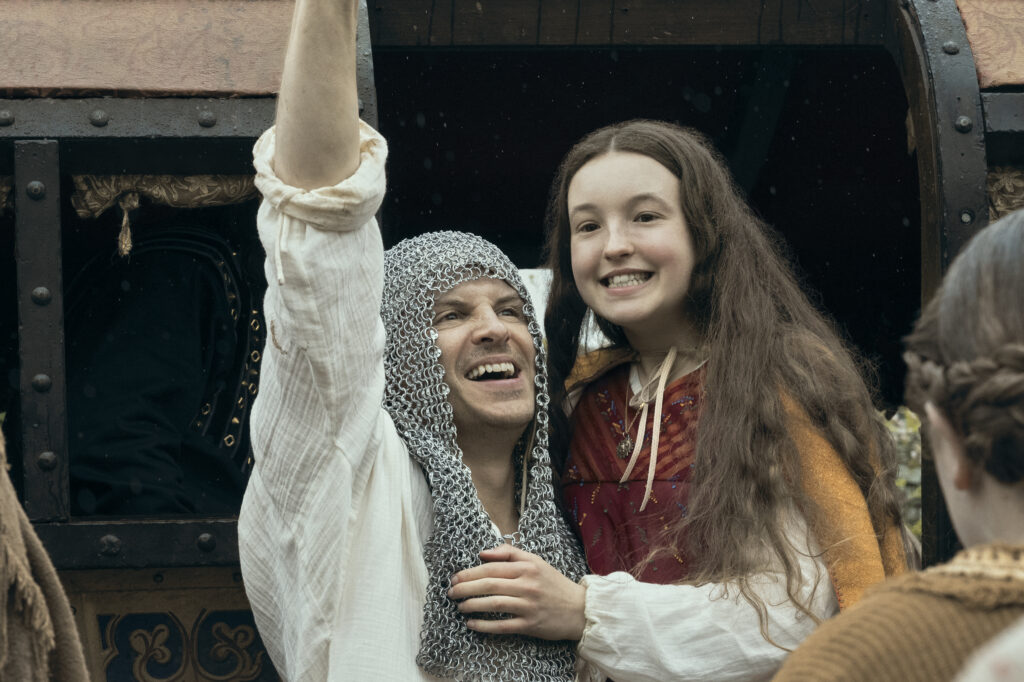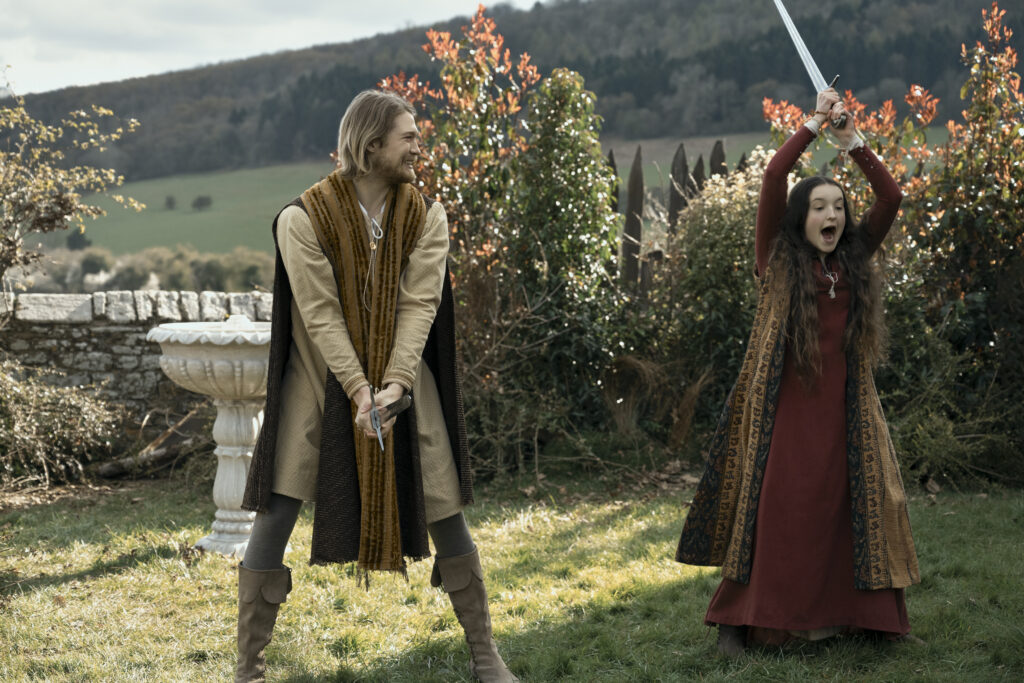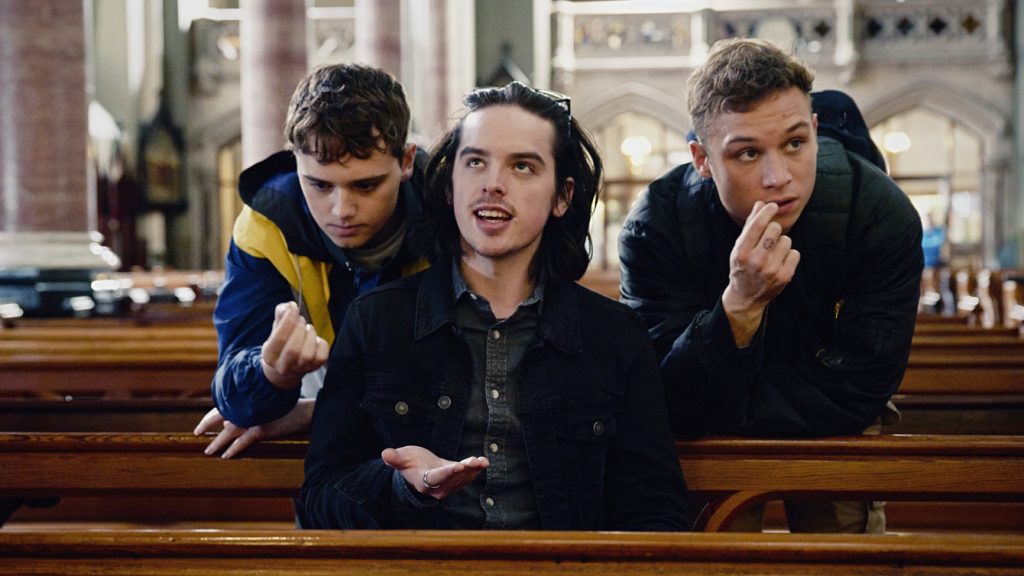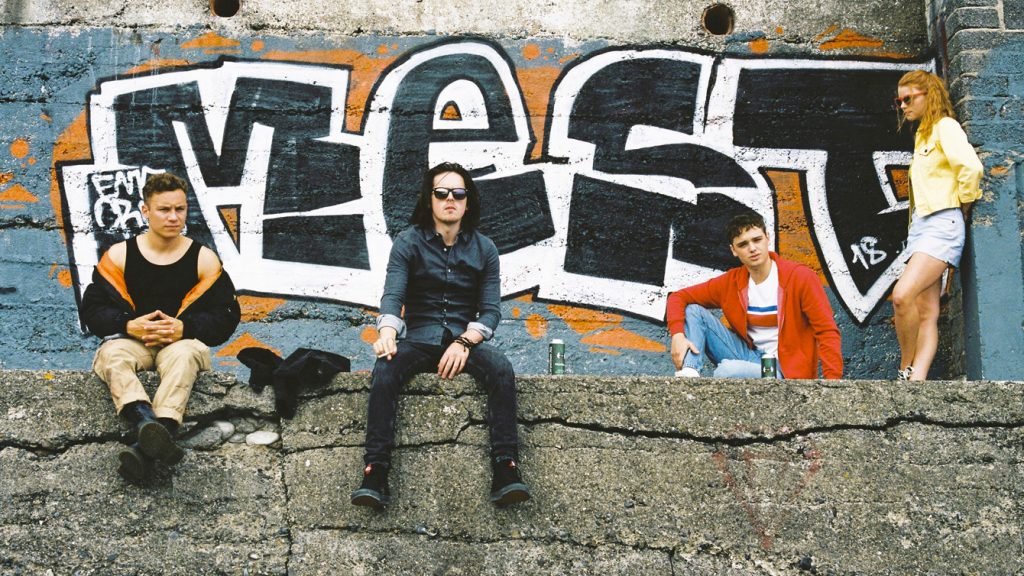December 19, 2022
by Carla Hay

Directed by Lena Dunham
Culture Representation: Taking place in Stonebridge, England, in 1290, the comedy/drama film “Catherine Called Birdy” features a predominantly white cast of characters (with a few black people) representing the working-class, middle-class and wealthy.
Culture Clash: A 14-year-old girl resists her father’s attempts to marry her off to any wealthy man who is the highest bidder and who can erase her father’s debts.
Culture Audience: “Catherine Called Birdy” will appeal primarily to fans of the novel on which the movie is based; filmmaker Lena Dunham; and slightly unconventional movies about female empowerment in the medieval era.

Just like the movie’s titular protagonist, “Catherine Called Birdy” can be petulant, repetitive and irritating, but it’s also got enough flashes of wit and comedy to be entertaining. Writer/director Lena Dunham creatively puts a modern spin on a medieval story. “Catherine Called Birdy” (which had its world premiere at the 2022 Toronto International Film Festival) is not going to appeal to everyone, but it does not try to be that type of movie.
Dunham adapted the “Catherine Called Birdy” screenplay from Karen Cushman’s 1994 novel “Catherine, Called Birdy.” It’s about a free-spirited teenage girl named Catherine, who prefers to be called Birdy (because she loves birds), and her attempts to assert her independence in the medieval era of England, when women and girls were treated as property regarding marriage and many other things. In the movie “Catherine Called Birdy” (which takes place in 1290, in Stonebridge, England), Catherine/Birdy (played with great enthusiasm by Bella Ramsey) is 14 years old and is expected to get married, much to her dismay. She’s also the constant narrator of the story, which takes place during at a time when the average human life expectancy was much shorter, and getting married at 14 years old was not only legal but it was very common.
Birdy does not want to get married not only because she doesn’t feel like she’s ready for marriage but also because her 41-year-old, greedy, alcoholic and conceited father Lord Rollo (played by Andrew Scott) is essentially auctioning her off for marriage to the highest bidder. All of Birdy’s “suitors” are men who are old enough to be her father or grandfather. Birdy’s 36-year-old mother Lady Aislinn (played by Billie Piper) is thought of in the community as “wise of spirit and fair of face,” according to Birdy. Lady Aislinn, who is pregnant for much of the movie, is incredibly patient with her loutish husband.
The other people in Birdy’s immediate family are her two older brothers: Edward the Monk (played by Archie Renaux), who is 21, is described by Birdy as “more fun than most monks.” Robert (played by Dean-Charles Chapman), who is 17 years old is “abominable,” according to Birdy. Robert and Birdy often get into nasty quarrels with each other, usually instigated by Robert, who likes to bully and insult Birdy.
Birdy’s three closest friends are also teenagers. Her best friend is 16-year-old Aelis Sidebottom (played Isis Hainsworth), an aristocrat who attracts a lot of male attention because of her good looks and family name. Then there’s 14-year-old eccentric Perkin (played by Michael Woolfitt), whom Birdy describes as someone who “likes to sleep in the hay, runs fast despite his limp, and farts a lot.” Her other close pal is 18-year-old dairy maid Meg (played by Rita Bernard-Shaw), who is modest and unassuming, compared to outspoken and gregarious Birdy.
Birdy says near the beginning of the film that her favorite activities include avoiding her chores, causing harmless mischief in the village, and eavesdropping. Her brother Edward advises her to write down her thoughts, which is why much of Birdy’s voiceover narration sounds like diary entries. When Edward gives her a book about saints, Birdy says in a voiceover, “Saints are just dinguses I’ll never meet.”
Even though Birdy comes from an aristocratic family, and she is a rare female in medieval times who knows how to read and write, she is still ignorant abut some basic facts of life. For example, when she gets her menstrual period for the first time, she thinks she’s dying. However, Birdy smart enough to figure out the meaning of menstruation, and she hides her bloody rags from her father, because she doesn’t want him to know that she’s physically mature enough to get pregnant. Birdy knows that her father would use that information in his attempts to find a rich husband for her.
However, Birdy is still not completely knowledgeable about sex and human conception. Early on in the movie, Birdy credits the family’s sassy Scottish maid Rowenna (played by Lesley Sharp) with teaching Birdy about how babies are made. Birdy says that babies are made by a man taking a heated iron poker, sticking it up a woman’s nose until there’s a hole big enough for his thumb. Then, he puts seeds in her brain, until they trickle down into her intestines, where they take root. When the baby is ready to be born, Birdy says the baby comes out of a woman’s rear end.
Birdy thinks of herself as fun and fearless. But she can also be tactless and insensitive. Her lack of manners and mischievous nature are often part of the film’s comedy. One day, Birdy tells Perkin: “You’re so lucky your father is dead.” Perkin replies, “Birdy, I’m still upset about that.”
There are many reasons why Birdy and her father do not really like each other. One of them is because he disrespects her. Lord Rollo calls Birdy a “leper.” And in a conversation with his wife Lady Aislinn, he tells her that the family is financially broke and “Birdy is our real currency, so we’re in real trouble.” He also seems to care so little about Birdy that he asks her what her age is because he can’t remember.
It’s easy to see why Lord Rollo has been irresponsible with the family’s money. He buys frivolous things, such as a tiger imported from Siberia. The tiger does not survive the trip. Because he has put the family in a dire financial situation, Lord Rollo is desperate to get Birdy married to a wealthy man as soon as possible. Her suitors include Finneas the Steward (played by Akemnji Ndifornyen); a middle-aged man from Kent who’s described as a “simple wool merchant” (played by Russell Brand); John of Normandy (played by Christophe Tek); Lord Rolf of Saxony (played by Douggie McMeekin); Godfrey of Glardenmere (played by Lawrence Hodgson-Mullings); and Balthasar of the Low Country (played by Bola Latunji).
Every time Birdy is introduced to a potential husband, she does something that she thinks will turn him off and make him lose interest in her. These tactics include pretending she has a virus, dressing as a “bogwitch,” and acting like she’s inseparable from her pet birds. The more that Birdy drives these suitors away, the angrier and more frustrated her father gets. In one scene in the movie, Lord Rollo physically abuses Birdy by beating her on her hands.
Birdy’s best friend Aelis also has family issues. Aelis’ 81-year-old father Lord Gideon Sidebottom (played by David Bradley) has a 25-year-old wife named Lady Berenice Sidebottom (played by Mimi Ndiweni), who despises him. Aelis’ stepmother Lady Berenice is just one of many examples of young women and girls in “Catherine Called Birdy” who are expected to marry older, wealthier men.
One of the reasons why Birdy finds so many of these suitors unattractive is that she’s smitten with her mother’s 28-year-old brother George (played by Joe Alywn), who is charming, good-looking, and everything that Birdy thinks she wants in a future husband. The movie doesn’t make it look like Birdy wants to commit incest with George, but instead portrays George as Birdy’s intense crush and an ideal for the type of man she would want to marry someday.
Things get complicated whn Aelis develops a crush on George too. Meanwhile, George shows a romantic interest in an older widow from Devon named Ethelfritha Rose Splinter (played by Sophie Okonedo), who has a 9-year-old son. And then, Birdy gets introduced to a lecherous, elderly and rich suitor named Sir John Henry Murgaw VIII (played by Paul Kaye), also known as Shaggy Beard, who won’t take no for an answer.
“Catherine Called Birdy” has a lot of fast-paced, snappy banter where people trade sarcastic barbs with each other. Birdy can be an annoying, self-centered brat, but she can also be perceptive and compassionate when she want to be. In other words, her flaws make her realistically human. Still, some viewers will find this character too hard to take and not be able to finish watching the movie.
The production designs and costumes are fairly accurate to this period of time. However, Dunham infuses a contemporary sensibility to the movie in some of the dialogue and with the choice of the movie’s soundtrack songs, which are all pop and rock tunes from the 20th century and 21st century. Misty Miller performs cover versions of Mazzy Star’s “Fade Into You,” Rod Stewart’s “Young Turks,” Supergrass’ “Alright,” Piper’s “Honey to the Bee,” “Elastica’s “Connection,” the Angels’ “My Boyfriend’s Back” and Alicia Keys’ “Girl on Fire.”
With its breezy tone that has a little bit of edge, “Catherine Called Birdy” is mature enough to appeal to adolescents and whimsical enough to appeal to adults. The movie also benefits from having a talented cast who can keep up with the dialogue and the pace of the movie in a way that looks natural, instead of overly rehearsed or awkward. “Catherine Called Birdy” has an ending that is radically different from the book. Considering what Birdy is all about, the ending is a delightful surprise, and what some people might say is an improvement on the original story.
Amazon Studios released “Catherine Called Birdy” in select U.S. cinemas on September 23, 2022. Prime Video premiered the movie on October 7, 2022.


